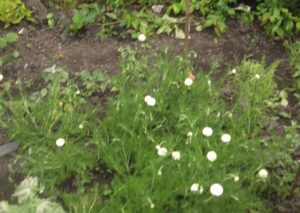
I’ve been making a translation of the Old English Lacnunga, usually translated as The Charm of Nine Herbs.

This glamorous one is mugwort ‘the first and the oldest of herbs’. The best guess of what the nine herbs are (and this is in serious dispute) is:
- mugwort
- plantain
- stonecrop
- nettle
- betony (possibly cockspur grass, but I’ve never found any medicinal use for that)
- chamomile (or mayweed?)
- crab apple
- thyme (some translations give chervil, but there is no record of medicinal use)
- fennel
I have done a quick run through, but I’m not sharing the result any time soon. Apart from the fact that my Old English grammar is worse than I remembered, some of the words are pretty obscure. I’m going to have to do some homework on it!
But I have already discovered that, despite the reference to Woden in line 34, the charm is neither so pagan nor so magical as is often claimed. There are several references to Christ, plus an extended reference to the Old Testament book of Ezechiel, and some of the text looks like a scratch translation from Latin. It’s not a well-written or a well-preserved document, but it’s fascinating.
Translators seem to have the notion that medieval medicine was a mishmash of ignorance, superstition and magic, and there is very little attempt to make sense of the instructions at the end. The otherwise careful and interesting Penn State Medieval Garden site says:
prose instructions are given to take the above mentioned herbs, crush them to dust, and to mix them with old soap and apple juice.Further instructions are given to make a paste from water and ashes, boil fennel into the paste, bathe it with beaten egg — both before and after the prepared salve is applied.
I don’t think this is the case. That phrase rendered as ‘old soap’ probably means the kind of salve base we would now make from beeswax and almond oil ‘for keeping’. The word ‘sapan’ means something like a gum or resin, a thickener. I found confirmation of this in Dorothy Hartley’s Food in England (1954), where she says that egg yolks are often used as a ‘natural soap to form the emulsion’ in mayonnaise. A ‘dust’ of herbs is foliage finely chopped to make an infusion, and the oil and beaten egg make a poultice or fomentation. The instructions to recite the charm while treating the patient may be magical – after all we are now aware that the placebo effect isn’t a cheat, but a therapy – but it is also quite likely to be a mnemonic, or a way to time the brewing of the infusion, or how long a poultice should be left in place.
The other thing I found delightful is the word ‘onflyge’, which literally means ‘flying in’. It is an airborne infection, as malaria was thought to be. It’s the same word as influenza. This makes me a lot happier than anyone of my age ought to be!
Apart from this, I’ve been at the wonderful Callander Poetry Weekend, and helping to form the infrastructure of a new collective to promote creative writing where I live – the Forth Valley Writers. There will be more about this over the next few weeks. And while I was doing it, the swallows and housemartins have gathered themselves together, and gone. One day last week there were five fledglings (probably a second brood) lined up on a windowsill, waiting to be fed, and then the sky was empty. This morning on the bridge over the river, I looked up to see a cloud of small black birds heading south, and heard the robins and wrens duking it out, singing to claim their territories for the coming winter. Though it is as warm and sunny as any day this year, summer is gone.